
Contact us
Our team would love to hear from you.

The increasing amount of data has unprecedented value in all industries, especially in healthcare. The process of examining these large and complex data sets to uncover hidden patterns, correlations, and insights is commonly known as Big Data analytics.
In this article, we will explore why Big Data analytics is so important, how it transforms care delivery, and some challenges when harnessing it.
With the proliferation of electronic health records (EHRs), telemedicine, and connected devices, the healthcare industry is producing and consuming more data than ever before. In fact, according to RBC Capital Markets, the healthcare industry is now generating approximately 30% of all the world’s data volume and by 2025, the compound annual growth rate of data for healthcare will reach 36%.
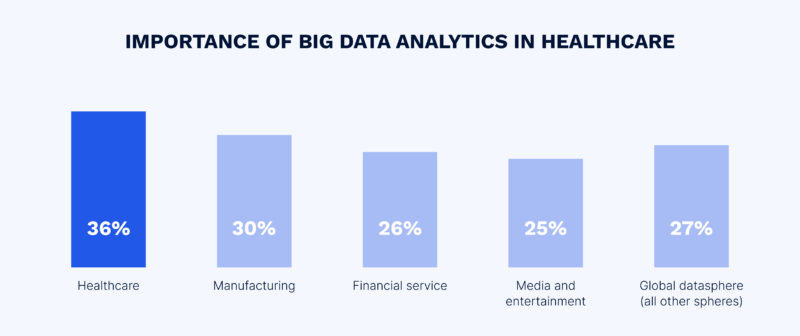
This huge amount of data offers great opportunities not only for the industry, but for mankind. Big Data analytics can be harnessed to solve a great range of problems. By analyzing large and diverse data sets, healthcare providers can gain insights into patient behavior, treatment outcomes, and disease trends. Using this information, they can develop more effective and personalized treatments, improve accuracy of diagnoses, and optimize resource allocation.
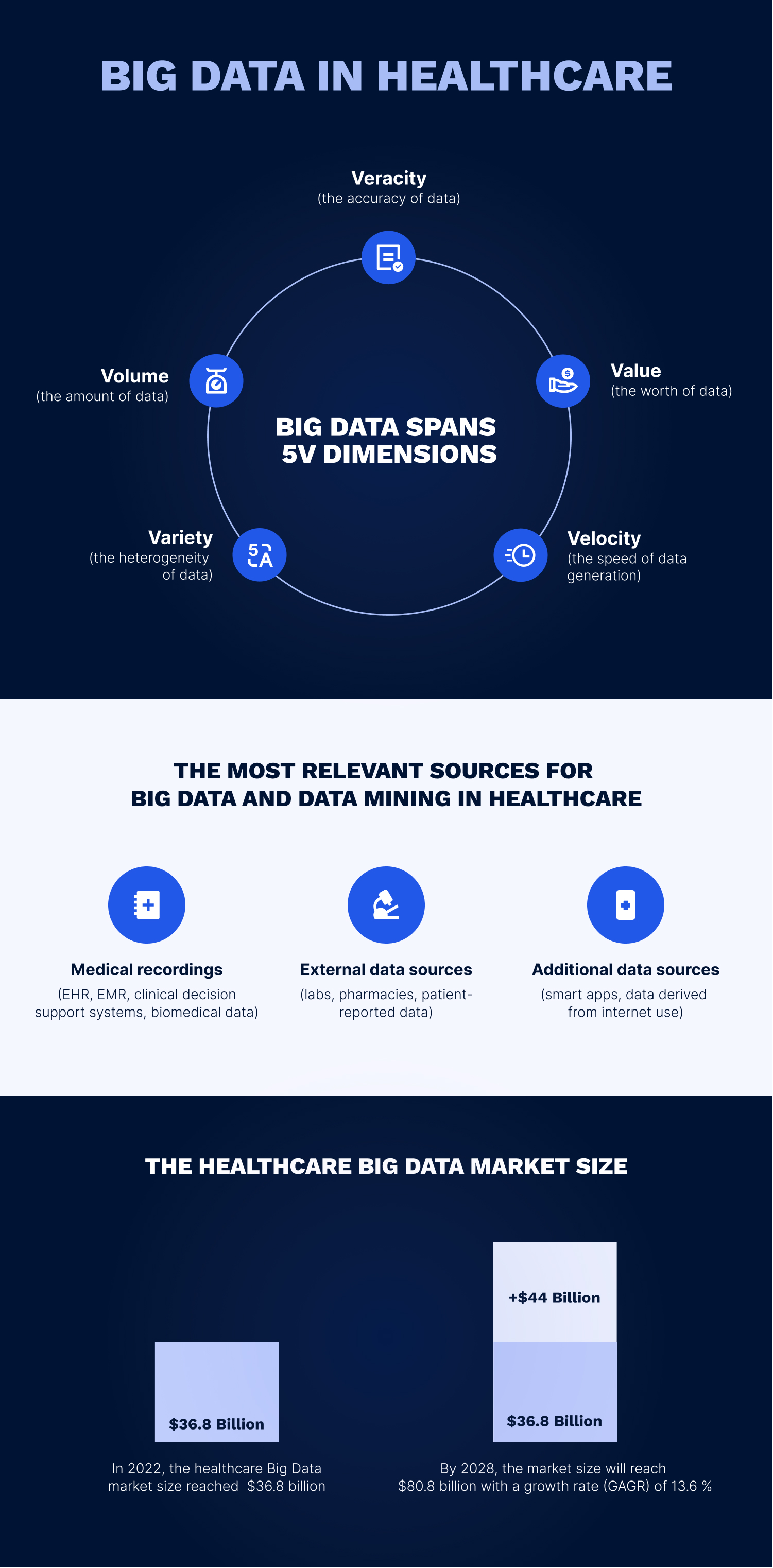
Note: Big Data is too large for traditional on premise data-processing systems to gather, store, manage, and analyze. Thus, to capture, aggregate, and process its volume, it is imperative to embrace new tools, such as Artificial Intelligence and Machine Learning, Medical Internet of Things, Cloud Computing, etc.
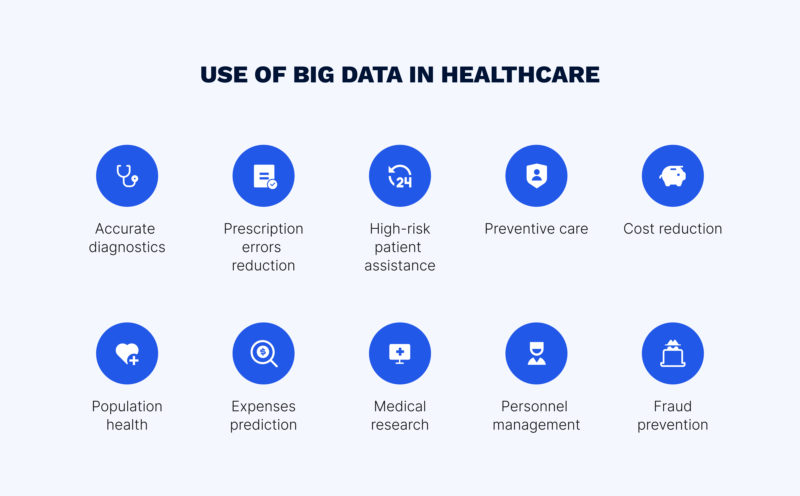
Big Data analytics helps doctors make more accurate initial diagnosis based on the data of patients with the same symptoms, lab test results, lifestyle, and genetics.
Software that uses Big Data analytics can compare patients’ medical history, including allergies and drugs they are using, and alert physicians in case of any inconsistency.
Big Data helps identify high-risk patients to offer them early interventions and closer monitoring.
Greater insight into medical data drives better patient outcomes and enables healthcare providers to handle patients’ conditions before an emergency occurs.
The use of Big Data analytics allows healthcare providers to reduce the duration of hospital stays, keep costs down, and reduce rehospitalizations.
Disease patterns predict how different types of diseases will evolve and can help plan preventive measures and work out effective treatments.
By analyzing statistical data, such as the number of follow-up visits, the prevalence of various pathologies, and the number of patients with chronic diseases, it is possible to forecast future expenses.
Big Data analytics assists in medical and pharmacological research to cure diseases and discover new treatments and medicines.
Collecting and using data to discover patterns can predict patients’ admission rates, so shift managers know how many people they should put on staff at a given time.
While streamlining insurance claims processes, Big Data analytics enables healthcare providers to detect fraud more easily and patients to receive payments faster.
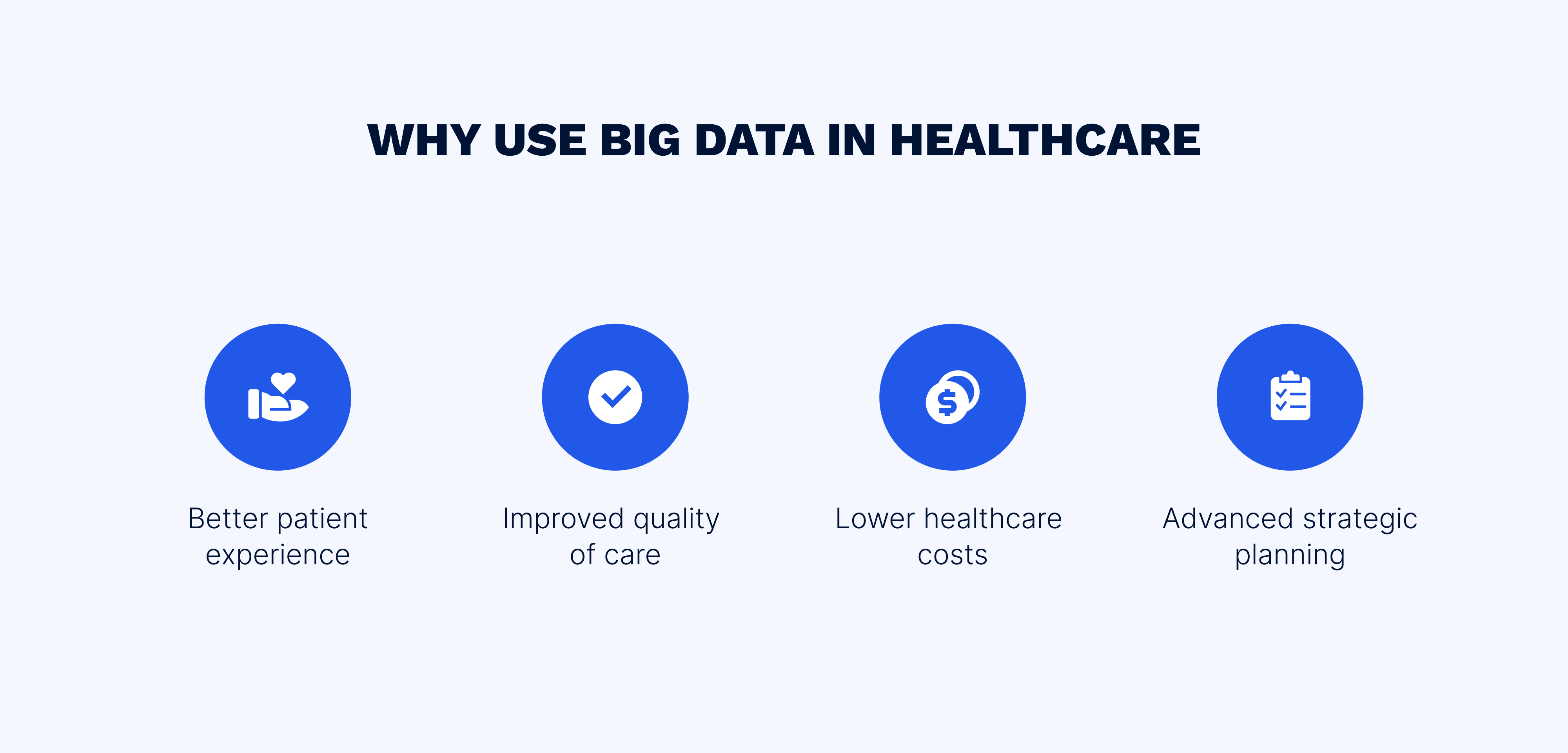
The success of Big Data analytics in healthcare directly depends on data providers, responsible for collecting, storing, and managing the data, and consumers, responsible for analyzing and using the data to make informed decisions. A critical component of Big Data analytics is the data pipeline, which is a series of steps involved in moving and processing data.
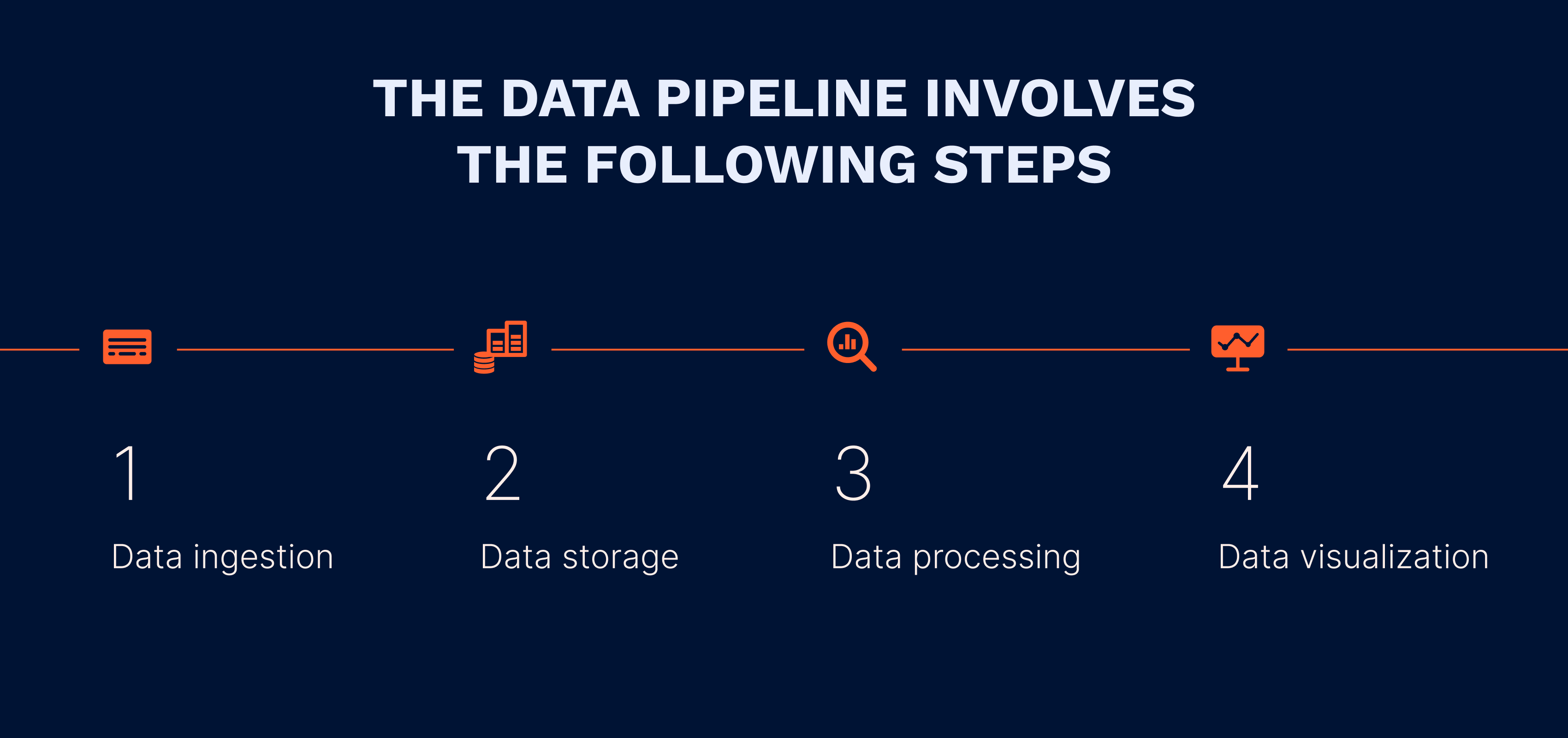
The other critical factors in the success of Big Data analytics are observability and security. Observability is the ability to monitor the data pipeline and identify any issues or deviations from the expected behavior. It is important to ensure that data is being processed in an accurate and timely manner.
Security is crucial to safeguard sensitive patient information and ensure data privacy. Thus, healthcare organizations must have robust security protocols in place to prevent unauthorized access and to provide secure data transmission and storage. This is primarily due to the fact that most data in healthcare falls under either PII (Personal Identifiable Information) or PHI (Protected Health Information), which are strictly safeguarded by regulations.

With the increasing amount of sensitive health information being generated and stored, it is crucial to ensure that it is protected and used in a responsible manner. Health information is a valuable asset, which is not lost on cybercriminals. To help control data leakage, there are regulations that establish frameworks and guidelines for data security.
A key role in shaping data governance in healthcare is played by HIPAA (Health Insurance Portability and Accountability Act) and GDPR (General Data Protection Regulation).
The regulations require healthcare organizations to ensure that they have the necessary policies and procedures in place to guarantee the security, privacy, and accuracy of data. This means implementing robust security measures to protect against cyberattacks, ensuring that the storage and use of data complies with regulations, and defining clear roles and responsibilities for data management.
Along with the advantages and potential of Big Data analytics in healthcare, there are challenges and limitations that can hinder its implementation. Some of the common issues include:
None of the benefits of Big Data are feasible if the information contained in various data sources is not consistent and universally understood. This is why it is imperative to keep data content standardized. Otherwise, the lack of standards may negatively affect the delivery of safe and effective care due to the inadequacy of different information technologies. Besides, any data that can be interpreted in more than one way leaves space for misunderstanding, and therefore, potential error in care.
It is necessary to mention that the cost of implementation still presents a considerable challenge to adopting Big Data solutions in healthcare. In addition to purchasing software tools for managing data, healthcare organizations have to allocate a budget for recruiting and paying salaries to the new talents that have the required skills to manage a huge volume of data, extract useful information, and run the analytics. Developing new knowledge essential for converting data into a strategic resource and implementing a new management practice or even organizational culture is a must. Failing this, there could be data entry failures that may result in placing information in the wrong record, losing valuable data, and limiting the value a business can gain from Big Data analytics.
Furthermore, some organizations have to replace their legacy IT infrastructure, which can also cause some problems in terms of costs. But in this case, money is not the only reason why some healthcare providers hesitate to adopt modern Big Data analytics tools. Many organizations are very comfortable with on-premise data storage that offers control over security, access, and up-time. These institutions do not consider the fact that an on-site server network also requires money and resources, as they are usually more expensive to scale and difficult to maintain.
To address the challenges, healthcare providers are adopting different approaches, such as:
Such large data sets are very difficult to handle in terms of storage and processing. Using normal computers to analyze them would be both impossible and impractical because of the time it would take. Therefore, Big Data is often generated by large, network-based systems.
Until recently, to solve the Big Data processing issue, there were open-source ecosystems. But such technologies carry some challenges as they require manual configuration and troubleshooting. So, companies started to migrate Big Data to the cloud.
Cloud technology has the potential to reshape the way healthcare organizations store and manage data. Providing cost-effective and fast access to data, adaptive storage platforms, and processing resources, the cloud offers agility and elasticity. With cloud computing, healthcare institutions leverage state-of-the-art infrastructure and pay only for the time and power that they use.
However, the implementation of cloud solutions for Big Data and Data mining in healthcare is faced with several challenges and limitations, particularly in regard to regulations.
One of the limitations of cloud implementation in healthcare is that public cloud providers may not meet the strict security and privacy requirements set forth by regulatory bodies. For this reason, many healthcare organizations implement private clouds or hybrid clouds, which offer more control over the security and privacy of the data stored in the cloud.
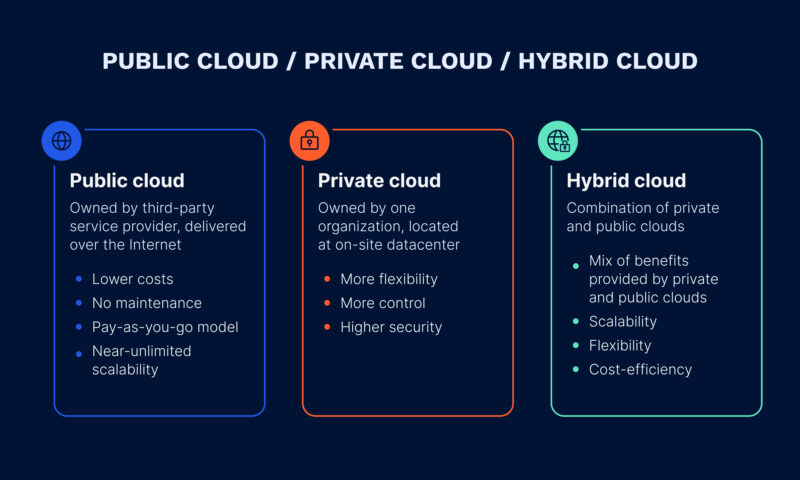
Private clouds, also known as internal or corporate clouds, represent a single-tenant environment that is accessible only by the organization that owns the cloud. Many healthcare organizations turn to this option as it is an easier way to meet all the regulatory compliance requirements and safeguard the sensitive information healthcare providers work with.
Integrating public and private cloud infrastructure, hybrid clouds may seem the perfect option for those who want to gain the advantages of both models. In this way, healthcare providers can use a public cloud for storing non-sensitive data and a corporate one for keeping confidential data.
Big Data analytics has already radically reshaped healthcare and will continue to drive changes in the industry. In the future, healthcare organizations will use more and more Big Data, which will become inevitable to stay afloat. With new technologies emerging and patients wanting more control over their wellbeing, it will be critical to understand how to scale your data to keep it relevant.
Technological advancements, such as wearable technologies, creative interfaces, machine learning, and IoT will affect the way healthcare data is collected and analyzed. Continuous monitoring of patient conditions through wearable devices and medical IoT will become commonplace and will enrich Big Data stores with a wealth of information. Using this information, healthcare marketers will be able to integrate large amounts of healthcare data to find and retain patients who are most likely to need services. In addition, the use of Big Data analytics will allow healthcare providers to engage patients in the care delivery process and improve the doctor-patient relationship. Our healthcare software developers have expertise in applying all of the above-mentioned tech trends.
Big Data is an extremely promising field with a lot to offer to medicine. It has every chance to make people’s lives safer and more comfortable. The use of Big Data can solve a lot of critical problems in healthcare and other related fields.
Given the exponential growth of data volumes and new tools for their advanced analytics, Big Data is very likely to revolutionize the whole industry. Already today, technologies for gathering and analyzing information help identify diseases of an individual patient and predict health status of an entire social group. Helping predict the evolution of various diseases, Big Data is the key to the development of preventive measures in healthcare, which can result in improved quality and longevity of life.
Although Big Data analytics solutions produce quality improvements, help keep patients happy, and take advantage of existing technologies, some companies may find it problematic to develop and implement such products. The best way to face this challenge is to do it together with a reliable ally.
Choosing a vendor is not an easy and quick process, so it is vital to take it seriously. A conscientious and experienced medical software company knows that Big Data analytics in healthcare is a highly personalized endeavor, and a system that may perfectly fit one organization, may yield too little or too much for another. Such vendors understand the goals of the organization they work with and know how to achieve them, recommending products according to the healthcare provider’s size, specialty and patient population.
If you are looking for a trusted partner with extensive experience for your Big Data project, contact EffectiveSoft!
Our team would love to hear from you.
Fill out the form to receive a consultation and explore how we can assist you and your business.
What happens next?